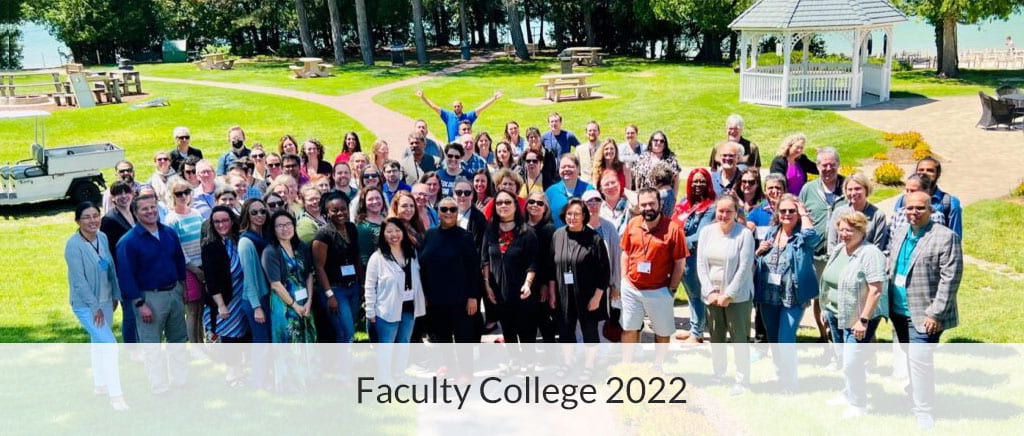Like many websites, Canvas collects data from users as they navigate their courses. Thankfully, unlike many websites, Canvas collects this data not for the purpose of selling it to advertisers but for the purpose of presenting it to instructors. Canvas presents collected student activity data in a course page titled “New Analytics,” which contains charts and tables designed to help instructors make use of this data. While New Analytics contains well-organized representations of course data, it does not prescribe specific actions or provide a formula for making use of the data. In this post, we summarize the data available in New Analytics and recommend ways you can interpret it to take actions in your course that can help improve student outcomes.
Detecting Course Trends

New Analytics can help reveal trends in student achievement from assignment to assignment and student engagement from week to week. After launching New Analytics from the course navigation menu or the button on the right side of the course Home page, you’ll see a series of tabs across the top of the page. The first two tabs, “Course Grade” and “Weekly Online Activity” have data views that can help you identify course trends. The Course Grade tab has a chart which shows the average grade for each assignment in your course. Each assignment in your course will be represented by a dot on this chart. The dot’s position on the y-axis represents the average grade for that assignment. A quick glance at this chart can help you identify the assignments where the class atypically excelled or struggled and help you confirm—or refute—suspicions you developed about performance trends while grading assignments. Thinking critically about why the class might have been more or less successful on a particular assignment can lead to ideas for course design improvements. A close look at a successful assignment may lead to insights on what works well in a course; a close look at a less successful assignment may reveal a need to incorporate scaffolding assignments and additional support. Clicking on an assignment’s dot on the chart will reveal additional statistics, including a grade distribution chart and the number of missing and late submissions.
Clicking the Weekly Online Activity tab will show a chart of the average page views and course participation actions during each week of the course. Viewing this chart can help you identify whether engagement with your Canvas course is waning, holding steady, or growing. Beneath the chart is a table of course resources which shows how many students have viewed each item, how many overall views it’s received, and how many times a student has participated (a list of the actions Canvas counts as a “participation” can be found in this Canvas guide). You can sort this table by any of its columns to identify which elements of your course get the most and least engagement. If an important resource in your course isn’t garnering as many views as you’d like it to, ask yourself “why?” and consider ways to either guide your students to that resource or phase it out and incorporate its key content into the resources your students are reliably viewing (Clum, 2021). Look at the resources that have gotten the most views and participation and check for commonalities to gain insight on what captures your students’ attention. You can click on any data point in the Weekly Online Activity chart to open a panel that shows activity data filtered for that specific week. The data in this panel can give you an idea of whether students are keeping up with the pace of your course or whether they are still working through older resources.
Checking on Individual Students
New Analytics can also help you identify students who may benefit from an intervention from a professional adviser because they have disengaged with your course or never engaged at all. The Students tab of the New Analytics page shows a table with the following statistics for each student:
- Current grade
- Percentage of assignment submissions made on time
- Last date of a participation action
- Last date the student viewed any page in your course
- Count of total page views
- Count of total participation actions
You can click any column header on this table to sort the table by that column. Looking at this table during the first few weeks of a term and sorting it by “Page Views” can help you quickly identify students who have not engaged with the Canvas course. Students with no or very low page view counts have not engaged with your course. You can issue an ad-hoc alert in EAB Navigate to request that UW-Green Bay’s professional advising team reach out and help set a student on a path to academic success.
Clicking on a student’s name in this table will open a student-specific data view that shows that particular student’s assignment grades and weekly activity over time. If you’ve noticed a downturn in a student’s performance or engagement, this view can help back up your observations with data. Comparing a student’s assignment grades or activity with the class average can help you contextualize any trends you see. You can view an individual student’s data alongside the class average on the same chart by adding that student to the filter field above the chart on the Course Grade or Weekly Online Activity tabs.
Sending Smart Messages

New Analytics also makes it easy to send messages to students who fit certain performance or activity criteria. As you explore the Analytics tool in your course, keep an eye out for the message icon that can be found on most of the tabs and panels. Clicking this icon will begin composing a Canvas Inbox message which you can send to students that meet a customizable criterion related to an assignment grade, weekly activity, or engagement with a specific resource. Here are a few examples of the types of messages you can target through New Analytics:
- Check-in with students who haven’t yet viewed the course this week
- Send congratulations to the students who did well on an assignment
- Encourage a growth mindset for students who struggled with an assignment and point them to helpful resources
- Remind students who have missing assignments to make a submission
These quick instructor encouragements and interventions can help your students stay engaged with the course and on-target to reach their goals (Bostwick & Becker-Blease, 2018). Especially in online asynchronous courses, sending these targeted check-in messages can help establish your presence and ensure that students know you care about their success.
Try It Out!
Coupling the data in Canvas New Analytics with the observations you make while teaching can help you make accurate judgments about what works well and not so well in your course. It can also help you identify when a student needs some additional support, and the incorporated messaging tool makes it easy to follow-up. We encourage you to open the New Analytics page in your Canvas courses, explore the data within, and ask yourself whether what you see aligns with your assumptions of how students experience your course. Try sending a congratulatory message to the students that excelled on an assignment and a friendly reminder message to the students who owe you work. We’d love to hear about your experience exploring and interpreting the data! Please feel free to reach out to us at CATL@uwgb.edu to tell us your story, ask a question, or request a consultation!
References
- Bostwick, K. C. P., & Becker-Blease, K. A. (2018). Quick, Easy Mindset Intervention Can Boost Academic Achievement in Large Introductory Psychology Classes. Psychology Learning & Teaching, 17(2), 177–193. https://doi.org/10.1177/1475725718766426
- Clum, K. (2021, May 14). Using canvas analytics to support student success. KatieClum.org. Retrieved December 5, 2022, from https://katieclum.org/2021/05/14/using-canvas-analytics-to-support-student-success/




